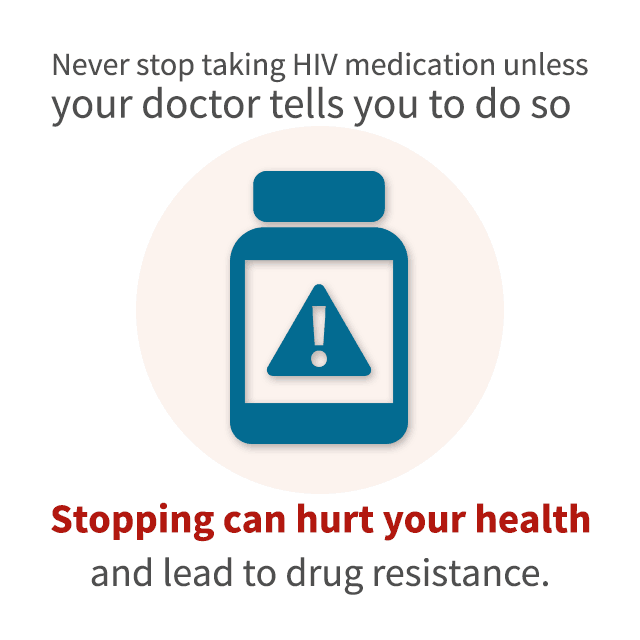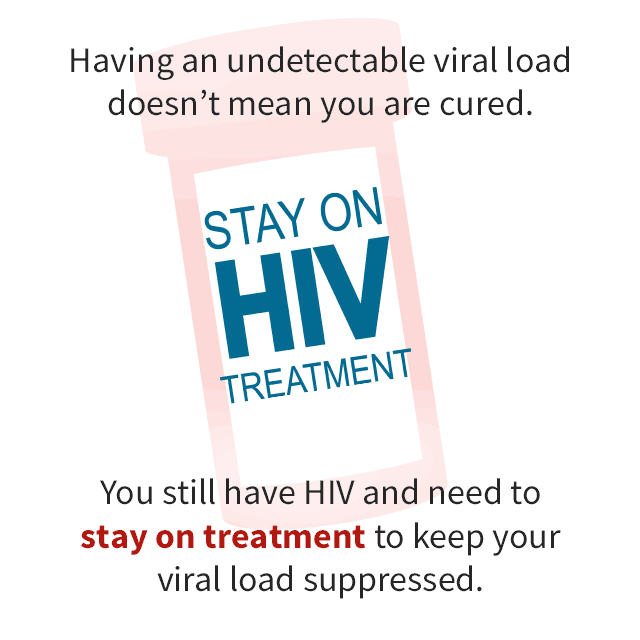Changing Your HIV Meds
At some point, you and your health care provider may decide to change your HIV treatment plan. Two of the most common reasons for making changes are drug toxicity and regimen failure. Drug toxicity means that your HIV medications cause side effects that make it difficult for you to continue taking them. Regimen failure means that the medications are not working well enough to control the HIV in your body. Regimen failure is often caused by poor overall health or poor treatment adherence, which can lead to drug resistance. Another reason for possibly changing your HIV drug regimen is pregnancy.
Or, as new HIV medications are developed, your provider may suggest changes to make your regimen easier, even if you are doing well (for example, changing from taking multiple pills to one combination pill.)
If you or your health care provider want to change your treatment plan, you should talk about the reasons for changing, and discuss:
- HIV medications you have taken before
- Problems you have had adhering to your medications in the past
- Any drug resistance tests you have had (recently and in the past)
- The HIV drug options that are open to you
- The strength of the new medications your health care provider recommends
- Possible side effects of the new medications
- How well you will be able to adhere to the new regimen
What About Taking a Drug Holiday?
Some people wonder if they can take a break or a "drug holiday" from HIV medicines. Studies have shown that such breaks in treatment can be very harmful to your health and are associated with higher risks of getting sick, having more side effects, and even death. For this reason, do NOT cut down on, skip, or stop taking your HIV medicines unless your health care provider tells you to do so. Stopping HIV medicines allows HIV to multiply and damage the immune system. This increases the risk of infections and cancer. Stopping HIV medicines also increases the risk of drug resistance.
There may be some instances when your doctor may suggest that you temporarily stop your antiretroviral drugs for certain specific reasons, such as if you are experiencing serious toxic effects from your medication, have an acute illness, or if you have a planned surgery and will not be able to take anything by mouth. In these instances, make sure you are making changes only in close consultation with your provider. How you stop taking your anti-HIV drugs safely can be a complicated process, and you should never change your treatment plan without talking to your doctor.
Smart Trial: A Study Of Drug Holidays
One of the largest studies that looked into the possible impact of drug holidays on HIV treatment was the Strategies for Management of Antiretroviral Therapy (SMART) trial. This NIH-funded study found that taking planned holidays from drugs as a way to reduce toxic effects of long-term therapy was dangerous and resulted in twice the risk of getting sick or dying. The SMART study demonstrated that the benefits of continuous antiretroviral therapy far outweighed the risks of toxic side effects. The virus was worse than the drugs. For more information, see the National Library of Medicine's Clinical Alert on the SMART study.
Can I Stop Treatment Once I Achieve an Undetectable Viral Load?
Some people with HIV wonder if they can stop taking treatment after they achieve an undetectable viral load. The answer is no. Having an undetectable viral load (meaning that the amount of HIV in your blood is too low to be detected on lab tests) is a sign that your HIV medications are working. But in order to maintain an undetectable viral load, you need to continue treatment. That’s because even though the virus is undetectable in your blood, it is still hidden in other parts of your body, such as your brain, reproductive organs, and lymph nodes. If you stop treatment, the virus will start reproducing again and your viral load will increase, putting your health at risk.
Related Topics on AIDS.gov
Additional Resources
- AIDSMap – Treatment Breaks

- AIDSinfo - HIV Treatment Fact Sheets
- AIDSinfo - Guidelines for the Use of Antiretroviral Agents in HIV-1-Infected Adults and Adolescents: Discontinuation or Interruption of ART
- AIDSinfo – Guidelines for the Use of Antiretroviral Agents in Pediatric HIV Infection: Discontinuation or Interruption of ART
- AIDS 2012 - Five Years After the SMART Study: A Paradigm Shifting Trial

- NIH – International HIV/AIDS Trial Finds that Risks of Death, AIDS and Other Major Diseases Increase on Episodic Antiretroviral Therapy
- OWH – Managing Your Treatment of HIV/AIDS
- VA – HIV Treatment Decisions
Last revised: 12/28/2015



